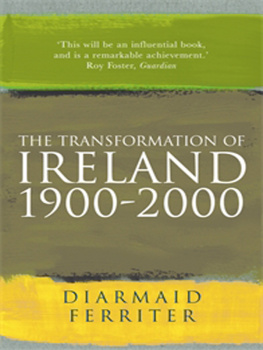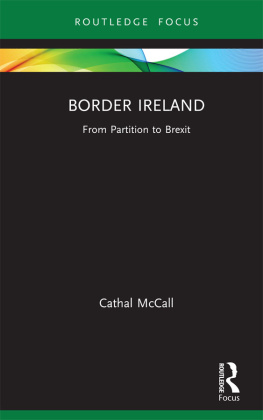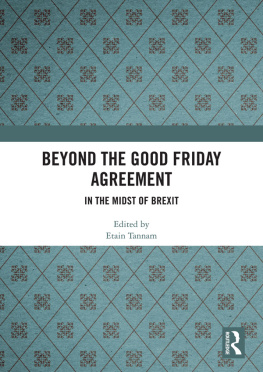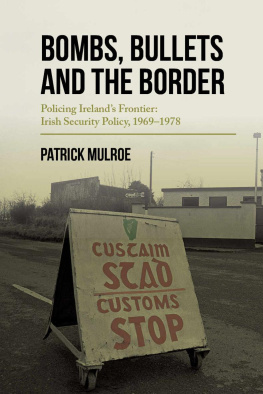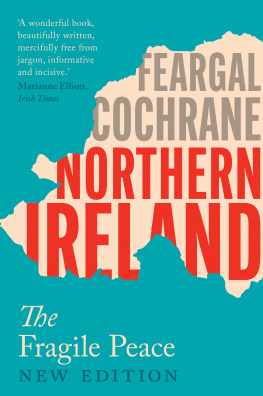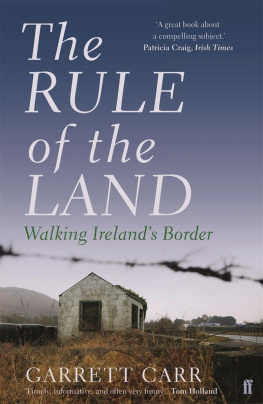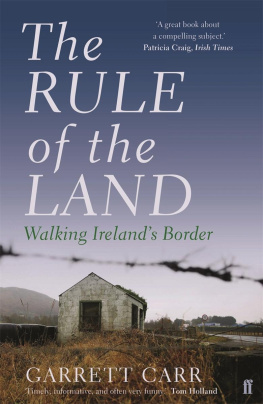The Border
Also by Diarmaid Ferriter
On the Edge: Irelands Off-Shore Islands: A Modern History
A Nation and Not a Rabble: The Irish Revolution, 191323
Ambiguous Republic: Ireland in the 1970s
Occasions of Sin: Sex and Society in Modern Ireland
The Transformation of Ireland, 19002000
Judging Dev: A Reassessment of the Life and Legacy of amon De Valera
The Border
The Legacy of a Century of Anglo-Irish Politics
Diarmaid Ferriter

First published in Great Britain in 2019 by
Profile Books Ltd
3 Holford Yard
Bevin Way
London wc1x 9hd
www.profilebooks.com
Copyright Diarmaid Ferriter, 2019
Cover image: 'Ireland' NASA
public domain photo by Jeff Schmaltz
Cover design: Keenan
The author and publisher give grateful thanks for the following extracts: Paul Muldoon, 1980, Why Brownlee Left, Faber & Faber Ltd; Seamus Heaney, 1999, Terminus, from Opened Ground: Selected Poems, 19661996, Faber & Faber Ltd; Seamus Heaney, 1987, Frontier of Writing from The Haw Lantern, Faber & Faber Ltd
The moral right of the author has been asserted.
All rights reserved. Without limiting the rights under copyright reserved above, no part of this publication may be reproduced, stored or introduced into a retrieval system, or transmitted, in any form or by any means (electronic, mechanical, photocopying, recording or otherwise), without the prior written permission of both the copyright owner and the publisher of this book.
A CIP catalogue record for this book is available from the British Library.
ISBN 9781788161787
eISBN 9781782835110
Contents
For my beloved brother, Cian
4
Violence and Containment
By 1969 the North was aflame and the border was once more in the spotlight in a contentious way. The emergence of the Troubles was due to a combination of failure to meet expectations about reform, militant Protestant backlash to talk of change, the civil rights movement championing nationalist grievances only to be brutally suppressed, British troops arriving in Northern Ireland in aid of the civil power, rioting at Catholic/Protestant interfaces, the beginning of the Provisional IRAs terrorist warfare and loyalist paramilitary retaliation. The endurance of the conflict over the subsequent three decades altered how the border question was framed with irredentist rhetoric, though not completely eschewed, ultimately superseded by a realisation that emotion needed to be replaced by reason.
Initially, however, the feeling generated by the violence created a sense in some quarters that the crisis could strengthen the prospects of a united Ireland. Some Irish diplomats foresaw Irish unity, but there was also acknowledgment of ignorance about northern unionists, and doubts about the wisdom of using the United Nations as a forum to highlight the growing crisis. Internal government documents show that, while it was recognised that the UN was unlikely to take action, it was important that the Irish government should be seen to be doing something for northern nationalists after the Irish external affairs (subsequently foreign affairs) minister Patrick Hillery, having been fobbed off by a junior minister in London citing the crisis as an internal UK matter, did not press the UN to bring the issue of intervention in Northern Ireland to a vote, since its rejection might be seen as copper fastening partition.
In November 1969, a memorandum from the Department of the Taoiseach reflecting on the outbreak of the Troubles had referred to southern Irish perceptions of the civil rights disturbances of the previous year. It was a time of heightened interest and awareness of the emergency in the North, but there was a suggestion that there could now also be a return to the lack of interest that had characterised southern attitudes to the North for decades. This was a position that had led to caustic remarks that the media and general public had only discovered the North on 5 October 1968, when police had violently broken up a civil rights demonstration in Derry (the city, located beside the border, was a cockpit of the civil rights movement). It was an observation that underlined ambivalence; Northern Ireland disturbances forced people in the Republic to think seriously about the border for the first time in decades, but there was no guarantee that such an interest would be maintained. Crisis engulfed Fianna Fil, in power under Taoiseach Jack Lynch since 1966. Lynch responded hesitantly to the violence that Northern Ireland civil rights protestors were subjected to, but came under pressure from hawks in his own party, who sensed an opportunity to push the anti-partition agenda.
A controversial issue that emerged in 1969 was whether the government of the Republic was prepared to contemplate the sending of Irish troops over the border in response to the escalation of violence in Belfast and Derry. Lynch in 1969 sought to ride two horses; in March he spoke of seeking unity in Ireland by agreement between Irishmen and abandoning all thought of using force as a means of undoing partition. But he had not yet dispensed with his partys traditional anti-partitionism when addressing its national executive and he was under considerable internal pressure. On the night of 13 August he announced in a television address that the Irish government can no longer stand by and see innocent people injured and perhaps worse; that it was establishing field hospitals along the border, and that it had asked the British government to seek the urgent dispatch of a UN peacekeeping force to Northern Ireland.
But a month previously, Patrick Hillery had asked, Wheres the Northern Ireland desk? at the end of his introductory tour of Iveagh House, the headquarters of his department, underlining the extent to which the Irish government was not remotely prepared for the Troubles.
In January 1970 the speech made by Lynch to his partys annual gathering was plaintive:
Partition is a deep, throbbing weal across the land, heart and soul of Ireland, an imposed deformity whose indefinite perpetuation eats into Irish consciousness like a cancer it is impossible for true Irishmen, of whatever creed, to dwell on the existence of partition without becoming emotional. But emotionalism and the brand of impetuous action on demand that it leads to cannot possibly solve, or even help in dealing with, such a problem.
There was a lot of exaggeration in this speech; true Irishmen were well able to remain unemotional about the border by not engaging with it in any way; the festering sore remained quite abstract for most. True, younger activists were determined to start new campaigns, North and South; as Bernadette Devlin observed in relation to the Battle of the Bogside in Derry, these people could never go back to the situation before August 12 1969. But the references to the dangers of action driven by emotion was also an indication that Lynch was being increasingly influenced by T. K. Whitaker, the renowned former secretary of the Department of Finance, now governor of the central bank and a close confidant of Lynch.
Whitaker had been born in 1916 in Rostrevor, County Down before the creation of the border and moved with his family over that border when a child. In the fervid atmosphere generated by the Troubles he warned Lynch that emotion is a dangerous counsellor. In 1969 he took control of Lynchs northern policy, wrote all his major speeches on this subject and proposed an all-Ireland federal authority. When Lynch gave a speech in Tralee in September 1969 affirming the commitment of the government to seek the reunification of the country by peaceful means through agreement and as a long-term project, this was the work of Whitaker.


